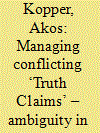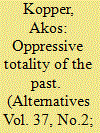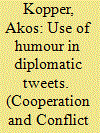|
|
|
Sort Order |
|
|
|
Items / Page
|
|
|
|
|
|
|
| Srl | Item |
| 1 |
ID:
118134


|
|
|
|
|
| Publication |
2012.
|
| Summary/Abstract |
Metaphoric descriptions of the world offer simple cognitive schemes to put things in their place, thereby offering keys to make reality easily interpretable. For centuries, the prevailing understanding of the political relied on an imaginary where borders were conceived like the lines of a coloring book, cutting political space into distinct state boxes, where citizens were defined congruously with the box of their state. The spatial knowledge inherent in this metaphor defined the dispositif of modernity-how to "map the world"-both in the socio-political and artistic domains. In the late nineteenth century, however, painting took a different understanding of spatiality and its representation. This article suggests that today-when the coloring book's imaginary is increasingly ill-fitted to describe socio-political realities-we could turn to art for a metaphor that would better capture late-modernity's understanding of borders and socio-political spaces. In sum, the article suggests turning to the paintings of Cézanne for inspiration.
|
|
|
|
|
|
|
|
|
|
|
|
|
|
|
|
| 2 |
ID:
146650


|
|
|
|
|
| Summary/Abstract |
The article is a study of managing interstate relations via ambiguity and secrecy. At the focal point of the article is the different constitutive logic of domestic politics and diplomacy in conceiving and managing social reality; with the former implying the notion of community and the latter separateness – the difference that allows for diplomatic conduct to rely on tacit agreements and ambiguity for managing contradictory ‘truth claims’, as China and Japan did in the case of the Ryukyu and later the Senkaku Islands. Such successful management is conditional on the parties' ability to control domestic narratives avoiding contradictions in their ‘truth claims’ becoming too blatant. Yet, modern technologies increasingly undermine states' capacities for this. The leaking on YouTube of the collision of a Chinese trawler with the ship of the Japanese Coast Guard in 2010 offers a perfect example. The incident aggravated the conflict and triggered intense debates on secrecy in Japan. The article concludes by arguing that once ambiguity and tacit agreements break down, leaders should turn to their public – recognize that noisy nationalist are frequently but a minority – and attempt to renegotiate ‘truth claims’ domestically to create the basis for a compromise.
|
|
|
|
|
|
|
|
|
|
|
|
|
|
|
|
| 3 |
ID:
113783


|
|
|
|
|
| Publication |
2012.
|
| Summary/Abstract |
Controlling for insecurities depends on a capacity to make inferences on the basis of experiences about the past, yet the use of knowledge about the past for anticipating and predicting future threats is highly problematic. This article examines the problem of governing individuals on the basis of what is available about their past deeds and social networks in governmental and commercial archives. It highlights the tension between administrative and private narratives about individuals, the former being constructed on the basis of minute details collected and stored about individuals since birth, and the latter referring to the accounts individuals offer of themselves. By applying the notions of ipse and idem identity developed by Paul Ricoeur, the article examines the two-way flow between memory and identity and the consequent concern that administrative narratives are blind to the ethical renewal of individuals, to the capacity of Man to extricate himself from the shackles of his past. To prepare the ground, the article considers some inherent limitations of biopolitics, pointing out that although biopolitics was classically concerned to govern both individual bodies and the body politic, administrative and governmental limitations have led states to govern the "average citizen" rather than individuals in their "individuality."
|
|
|
|
|
|
|
|
|
|
|
|
|
|
|
|
| 4 |
ID:
181534


|
|
|
|
|
| Summary/Abstract |
Today diplomacy increasingly relies on tweets. Yet, as tweets only allow for 280 characters, statements must be brief and impactful, which encourages the use of humour in conveying one’s message. This article scrutinizes irony and ridicule in diplomatic interactions. Even though these forms of humour may antagonize parties and even turn issues into a security concern, this article points out that they also have an affiliative aspect and could play a conflict-mediating role. Because humour, especially irony, is easy to misunderstand (especially in cross-cultural settings), many warn against using them in diplomatic exchanges. Nevertheless, I will argue that they are ideal for expressing multi-layered messages, enabling the speaker to rely on what is often called ‘constructive ambiguity’, which is often useful in diplomatic conduct. Two case studies illustrate the argument. The first focuses on cartoons ridiculing President Wilson in the early 20th century for his reluctance to commit the US to join WWI (suggesting that cartoons of the time might be predecessors of today’s tweets), and the second on tweets published by the British Embassy in London apropos of the Skripal case (offering an example how humorous tweets can convey multi-layered, complex messages).
|
|
|
|
|
|
|
|
|
|
|
|
|
|
|
|
| 5 |
ID:
157224


|
|
|
|
|
| Summary/Abstract |
The article focuses on the image the discipline of International Relations (IR) projects of itself via visuals, particularly the image of chess on IR book covers. It points out the corroborative and critical role that images can play in defining the way we see IR. The article underlines particular features of visual metaphors, first pointing out their role in the epistemological process, and second, highlighting their capacity for voicing an expressive and captivating critique of the social world, which is enabled by the template they offer, a template that may be distorted and manipulated for expressing criticism. Finally, the article reflects on the image chess conveys about expectations of the kind of knowledge IR as a discipline could provide for “mastering” the world and identifying a winning strategy. Here, the image of chess is compared to insights offered by Clausewitz’s pendulum.
|
|
|
|
|
|
|
|
|
|
|
|
|
|
|
|
|
|
|
|
|